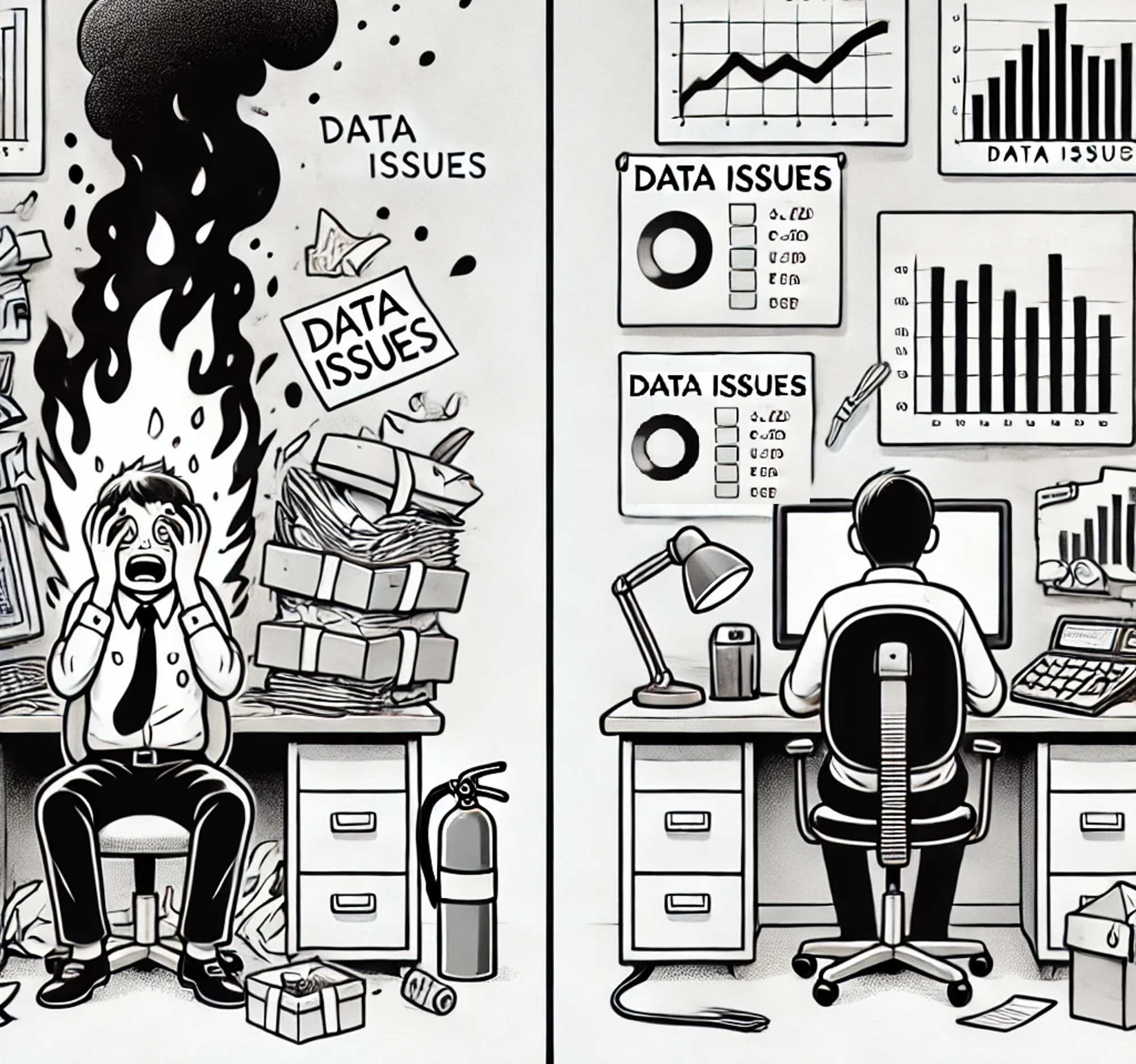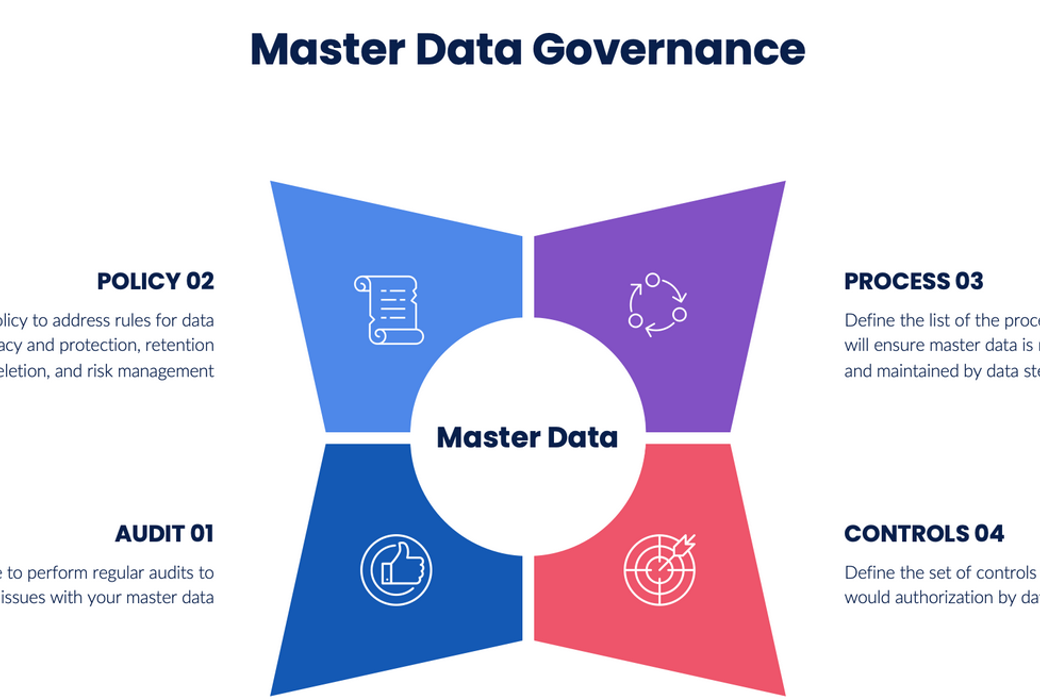Moving from Reactive to Proactive Master Data Management
The importance of structured and well-organized Master Data Management (MDM) in companies across the globe should be a no brainer. Yet, many organizations remain stuck in reactive mode—constantly firefighting data issues instead of proactively managing critical information. It’s a familiar scenario: MDM teams scramble to fix one urgent problem after another, manually correcting and adjusting data in multiple systems. But this crisis-driven approach limits their ability to create long-term impact.
Perhaps this is the best possible time to stop reacting and start governing your data with a forward-looking strategy that drives real business value.
Why move from Data Firefighting to Data Governance?
Thanks to transitioning from a reactive to proactive approach your MDM team no longer simply puts out fires; instead, they oversee data governance aligned with broader organizational goals. Here’s how that shift benefits everyone:
-
Strategic Planning Over Crisis Management: Your MDM team will focus on data strategies that align with long-term business goals, instead of constantly putting out fires.
-
Mastering Analytical Tools: By developing advanced analytical skills, your team becomes adept at interpreting data to uncover actionable insights which also gives them the ability to properly clean it.
-
Direct Contribution to Business Success: Data governance evolves into a key part of strategic decision-making, with MDM professionals becoming key contributors to business success.
-
Driving Innovation: By using data to inform strategic decisions, your team can become a driving force for innovation within the organization.

Embracing Proactive MDM: Game Changer
A proactive MDM strategy is extremely beneficial for both your data team and the broader business. Rather than waiting for the next data crisis to erupt, a proactive approach uses predictive analytics, machine learning, and AI to spot problems early. This early detection paves the way for continuous improvement and enhanced operational efficiency.
By adopting a proactive approach, your MDM team can:
-
Improve Data Quality and Consistency
Address potential issues before they arise, ensuring the data your business relies on is timely and accurate.
-
Enhance Operational Efficiency
Using predictive tools, your team can resolve bottlenecks and optimize workflows more effectively.
-
Strengthen Decision-Making
When leaders have cleaner, more reliable data, they can make confident, well-informed decisions.
-
Reduce Risk
Catching errors early helps avoid costly mistakes, safeguarding your operations and budget.
-
Ensure Compliance and Audit-Readiness
Adhering to audit and compliance rules mitigates fraud risks and prevents audit failures.
"Transitioning from reactive to proactive Master Data Management enables organizations to focus on long-term strategies, improving data quality, operational efficiency, and decision-making while reducing risks and fostering innovation."
Pascal Decock - SAP MDG Solution Architect
Leveraging tools like SAP MDG or SimpleMDG
Solutions such as SAP Master Data Governance (SAP MDG) or SimpleMDG enable organizations to manage and maintain their most critical data—customers, suppliers, products, and financial information—on a single, consistent platform. Think of these tools as the single source of truth: everyone works with the same “official version” of the data.
However, having the tool, does not always equal using it to its full capability. What is important to think about is how to leverage all that it can offer. To establish rules and guidelines that together with the tool will bring you into the era of Data Governors and out of the dark ages of constant fire fighting.
Here are fundamental data quality requirements that tools like SAP MDG or SimpleMDG help you implement:
-
Golden Rules
Define and enforce business rules that ensure only valid and correct data enters your systems.
-
Centralized Data
Consolidate your most important data in one place. This supports consistent access and educates centralized teams through data dictionaries.
-
Quality Checks
Identify and fix errors, duplicates, and missing data regularly. Ongoing lifecycle management and periodic cleansing activities keep information fresh.
-
Streamlined Workflows
Manage data changes through clear approvals and processes, aligning with business needs.
-
Predict and Prevent Issues
Tap into predictive analytics to detect potential data quality problems before they disrupt your operations.
-
Governance Frameworks
Establish robust governance structures to ensure consistent, accurate, and compliant data management across the organization.
-
Automation of Repetitive Tasks
Free your team from manual data entry, letting them focus on value-added, strategic work.
-
Deeper Data Insights
With high-quality data, you can uncover hidden patterns, fostering more informed, innovative decision-making.
Conclusion: Entering a New Way of MDM
The journey of transforming your Master Data Management in all honesty is not easy. It requires rules, very often a change in management style and a change in the mindset of the users. Having the technology is not the only thing that you must look at. You must combine business knowledge and experience with which you can utilize the technology to its fullest capacity. The process is not short and far from simple. However, the outcome of it is clear principles, less fires to put out, happier teams and a lot more productive environment for all.
To have a forward-looking mindset and to fully utilize MDM/MDG capabilities – like predictive analytics, AI-driven insights, and robust governance frameworks – your organization must set forward on this journey with an open mind. The result might just blow your mind on how innovative, succesfull and data driven you will become.
Don’t let your MDM team remain trapped in an endless cycle of data firefighting. Unlock the true power of your data by taking a proactive stance. Empower your MDM professionals to move beyond crisis management and become strategic enablers of the future of your business. The next era of MDM is proactive, strategic, and ready for you to embrace—so, are you prepared to make the leap?
Are you encountering challenges or issues with your SAP MDG implementation or seeking a fresh perspective on your strategy? Reach out to us for a comprehensive health check of your master data system and strategy—let's ensure you're on the right track!
If you need any more information on this topic, fill in the form below, and one of our experts will get in touch soon!

Natalia Rossa
Senior SAP Master Data Consultant
10 years of experience as a SAP MDG Functional Consultant specializing in master data governance, data quality, and business process optimization. With a strong background in SAP MDG implementations, successfully guided organizations through their MDM journey, ensuring effective data ownership, process alignment, and user adoption.
Proficient in Business Partner, and Material master data domains, helps businesses establish governance frameworks and data stewardship models that drive operational efficiency. By bridging the gap between business and IT, translates complex requirements into scalable SAP MDG solutions, enabling organizations to achieve sustainable master data excellence.
Whether leading greenfield implementations, migrations, or optimizations, applies a structured yet adaptable approach, focusing on process improvement, data accuracy, and system integration to deliver high-quality, well-governed master data.
Featured articles






